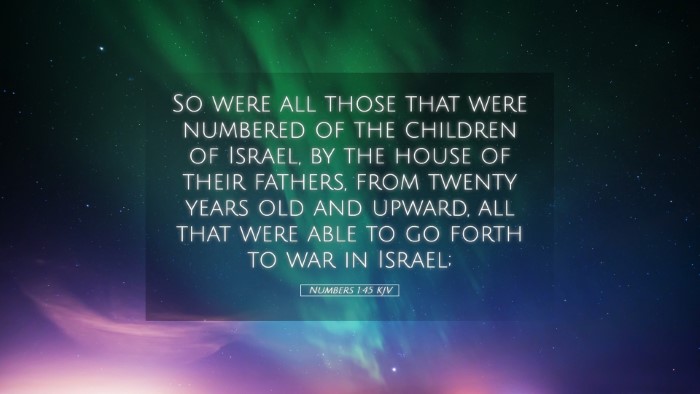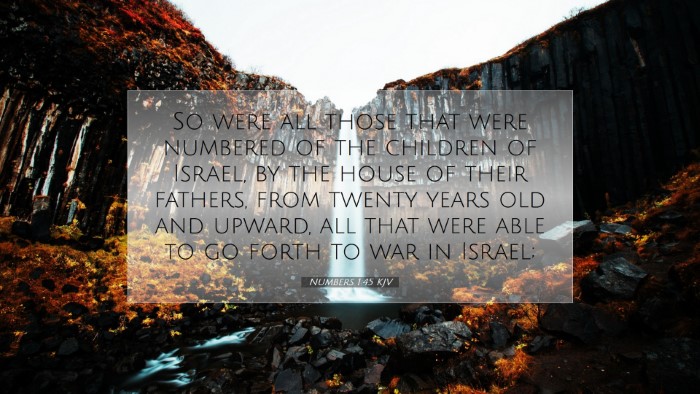Commentary on Numbers 1:45
Contextual Background
The Book of Numbers primarily addresses the Israelites' wanderings in the wilderness. This chapter commences with a census, signifying God's organized approach to the governance and movement of His people. The orderliness of Israel's encampment and military preparations reveals a divine strategy for future endeavors, including entry into the Promised Land.
Verse Analysis: Numbers 1:45
“So were all those that were numbered of the children of Israel, by the house of their fathers, from twenty years old and upward, all that were able to go forth to war in Israel.”
1. Enumeration of the People
This verse emphasizes the importance of counting the males who are twenty years and older, as they are deemed capable of warfare. According to Matthew Henry, the act of numbering serves a dual purpose: practical and spiritual. It reflects both the preparedness of Israel for their upcoming challenges and God's faithfulness in maintaining the lineage of His chosen people.
2. The Role of the Fathers
The phrase "by the house of their fathers" indicates familial representation. Albert Barnes notes that God's design is to establish a nation built on the principle of family, emphasizing the communal and generational aspect of faith. This familial structure provides not only a sense of identity but also accountability in the faith journey.
3. Age and Capability
The age specification—twenty years and up—highlights a threshold of maturity and responsibility. Adam Clarke remarks that this age criterion reflects an understanding that those below this age are generally untested and therefore not called to bear arms. This criterion suggests that spiritual warfare, akin to physical warfare, requires maturity and distinction between the roles within the community.
4. Preparation for War
The reference to being "able to go forth to war" speaks to the readiness of the people to defend their faith and heritage. Henry articulates that this is indeed preparation for the conflicts to come, not merely a count for civilian purposes. It signifies the necessity of being vigilant in spiritual matters as well, applying the principle of our modern spiritual warfare as believers called to stand firm against trials and temptations.
5. Biblical Themes
- Leadership and Organization: The need for structure among the Israelites is apparent. Order is critical in any significant undertaking, and this counts for both ecclesiastical and secular organizations.
- Identity and Legacy: Every man counted contributes to the identity of Israel. This highlights the importance of recognizing our roles within the Body of Christ today.
- Spiritual Warfare: As Christians, understanding our preparedness is vital. Just as Israel prepared for physical battles, believers are called to an ongoing engagement with spiritual realities.
Practical Applications for Today
As pastors and leaders, the thoughtful approach to leadership and the necessity of fostering a sense of belonging within the congregation can be drawn from this passage. Barnes reflects that each member must understand their role in the collective aim of advancing God's kingdom.
Clarke highlights the importance of accountability and readiness. In congregations, it is crucial to encourage maturity among members—whether through discipleship programs, small groups, or mentorship initiatives—as all believers are called to be spiritually equipped.
Furthermore, it serves as a reminder that the Christian life is not passive; it involves active engagement in what God is doing both within individual lives and across the congregational landscape.
Theological Implications
The collection of this data, as indicated in Numbers 1:45, supports the view that God is deeply involved in the administrative aspects of His people’s lives. Not only does He care for their spiritual needs, but He also oversees their physical and practical preparations. Henry offers profound insight suggesting that this divine involvement assures us that God governs all aspects of existence—individual, communal, and cosmic.
The preparation for war is also allegorical. The church today must remain vigilant, discerning the battles fought in prayer, doctrine, and community outreach, fully aware that "we do not wrestle against flesh and blood" (Ephesians 6:12). This verse continues to speak to the need for believers to engage in disciplined spiritual lives, preparing ourselves for the challenges ahead.
All these elements grain toward a holistic view of God’s redemption plan through His people, providing an enlightening engagement for today, encapsulated in the communal aspect of salvation and the understanding of our collective national identity as the Body of Christ.


